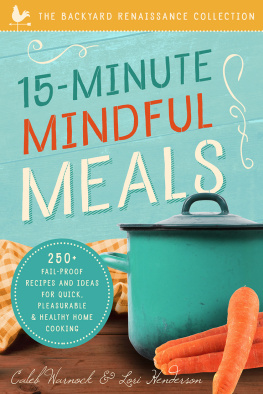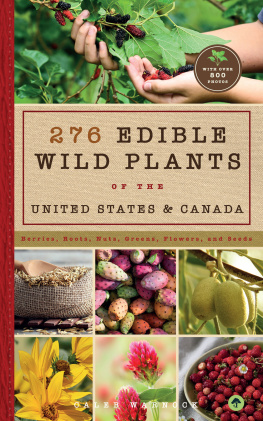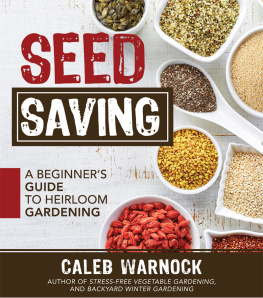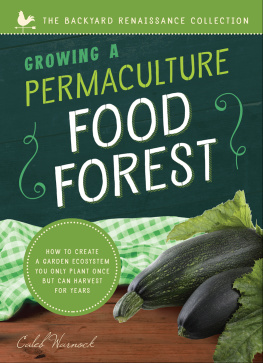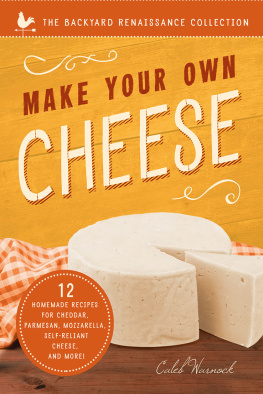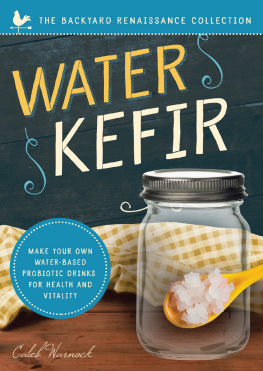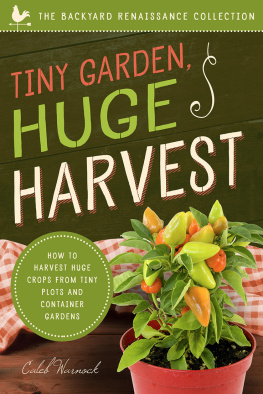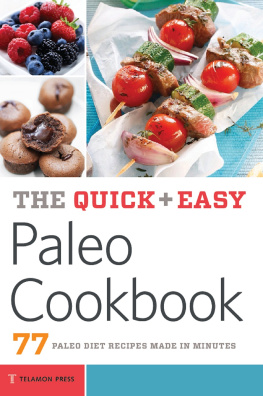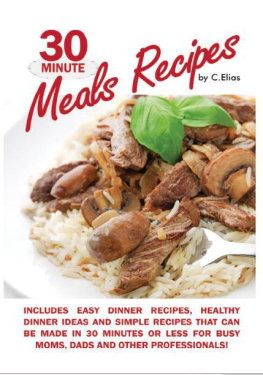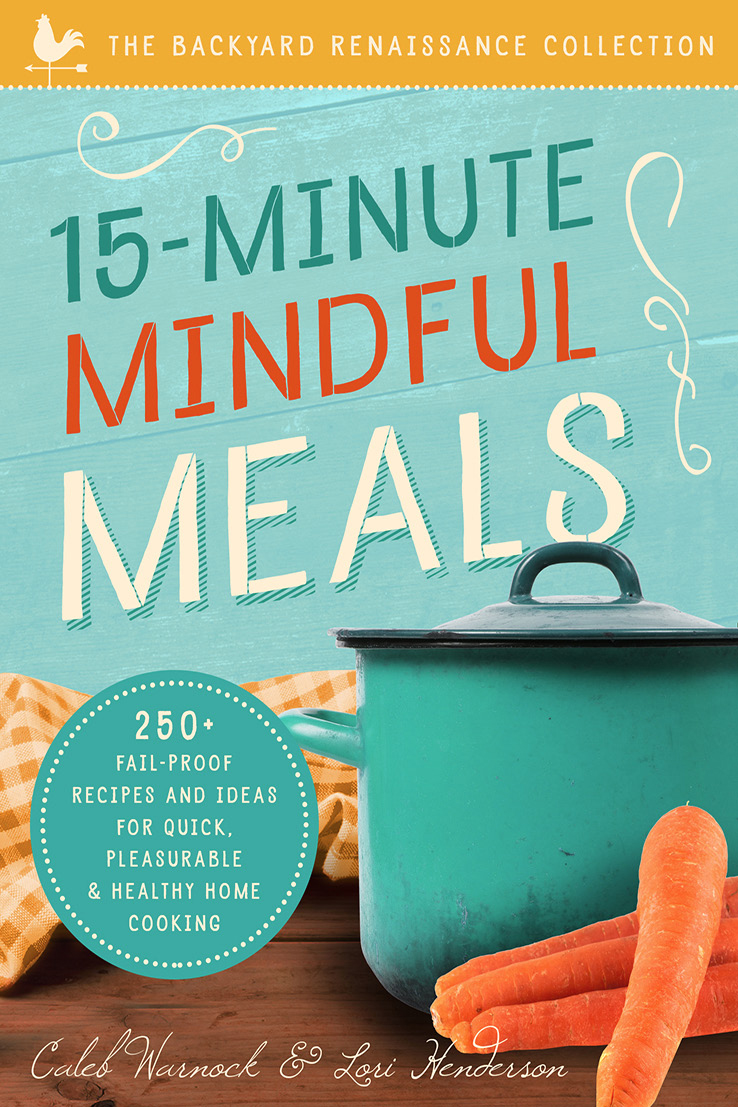
DISCOVER THE LONG-LOST SKILLS OF SELF-RELIANCE
M y name is Caleb Warnock, and Ive been working for years to learn how to return to forgotten skills, the skills of our ancestors. As our world becomes increasingly unstable, self-reliance becomes invaluable. Throughout this series, Backyard Renaissance , I will share with you the lost skills of self-sufficiency and healthy living. Come with me and other do-it-yourself experimenters, and rediscover the joys and success of simple self-reliance.

Copyright 2016 by Caleb Warnock and Lori Henderson
All rights reserved.
Published by Familius LLC, www.familius.com
Familius books are available at special discounts for bulk purchases, whether for sales promotions or for family or corporate use. For more information, contact
Familius Sales at 559-876-2170 or email .
Reproduction of this book in any manner, in whole or in part, without
written permission of the publisher is prohibited.
Library of Congress Cataloging-in-Publication Data
2016942208
Print ISBN 9781942934691
Ebook ISBN 9781944822163
Printed in the United States of America
Edited by Emily Faison
Cover design by David Miles
Book design by David Miles and Kurt Wahlner
10 9 8 7 6 5 4 3 2 1
First Edition
WHAT IS A MINDFUL MEAL?
I recently made a pot of soup. I often make soup, but this soup was different. Not because the ingredients were unique but because I was engaged in the preparation. The recipe instructed me to mince the onion, slice the carrots, dice the squash, chop the asparagus, and grate the zucchini into noodles. I found myself enjoying each step and appreciating the colors, textures, aromas, and flavors of each vegetable. I felt the pleasure of having grown some of them in my garden.
I pondered the path of the others involved: the farmers, who cared enough to plant organic seeds and grow the vegetables in a healthy and earth-sustainable manner; the soil, pulsing with life and life-giving minerals; the water, which enabled the little seeds to grow to maturity; the sun, generously warming the soil and sharing its light for the plants to grow and for us to witness the miracle of plant life; the honeybees, drawn by the colors and scents of each tiny blossom to pollinate and awaken the vegetables to life. Pondering all the potential inherent in each tiny seed is exhilarating!
I put all the vegetables together in a pot of broth (vegetarian, in this case) and let them blend to perfection. Infused with the energies of joy and gratitude, I knew this would be a happy, healthy meal.
While the soup simmered and filled the kitchen with lovely aromas, I prepared the salad with the same mindfulness as I had prepared the soup: a beautiful mix of fresh greens of varying shades and textures, topped with a fan of pear slices, chopped walnuts, a sprinkling of dried cranberries, and a drizzle of homemade salad dressing. The final adornment: a trio of red, orange, and yellow nasturtium flowers, edible, with a mild radish flavor.
Now it was time to set the table. I set out some pretty plates and bowls and thought tenderly of my sister, who had recently passed away. These dishes had belonged to her, and she offered them to me shortly before her passing. I filled the glasses with purified watersomething I am grateful to have access to. I put out a plate of natural yeast sourdough bread with homemade butter, then I hurried to my herb garden and filled a vase with flowering peppermint and lavender stems. The bees were buzzing on the tiny blossomsmusic to my ears.
As I completed all the preparations, I thought about a new friend who would arrive shortly to share this modest meal. What would we talk about? What would we have in common? Would she appreciate and value the same thingsorganic, healthful foods; natures gifts; simple beauty; pretty dishes?
Indeed. As we sat, she asked if she could offer a blessing on the food. She expressed gratitude for the colors and beauty and healthfulness of the foods we were about to eat and for the blessing of friendship. As we eagerly feasted, she asked: Have you ever practiced mindfulness?
I felt my heart smile!
Friendship is born at that moment when one person says to another: What! You too? I thought I was the only one. C. S. Lewis |
A Mindful Kitchen
Learning to choose wholesome, healthy foods over man-made pseudofoods is a journey. In classes and on my radio show, I teach my students to celebrate friendship, etiquette, taste, texture, aroma, and beauty and the sound of joyful conversation, music, laughter, expressions of gratitude, and gladness.
Several years ago, I attended a lecture by Michael Pollan at Abravanel Hall in Salt Lake City, Utah. Slow Food Utah organizers had invited him to speak about the nature of food, our environment, and healthful eating. He displayed on a large screen a photo of a decadently rich and luscious slice of chocolate cake. The reaction, as he expected, was a collective groan of desire and guilt from the audience. In America, he explained, that is the general reaction. But he encouraged us to think about food in a new way. In France, he explained, the reaction to a slice of cake is one of celebration, not guilt.
One of my favorite books is French Women Dont Get Fat: The Secret of Eating for Pleasure by Mireille Guiliano, an absolutely delightful and inspiring read. It seems that French people seem to live with wisdom, taking pleasure in staying thin by eating well, while Americans typically see food as a conflict and obsess over it. The French think about good things to eat, while Americans worry about what might be bad for us. The French dont eat fat-free, sugar-free, or anything artificially stripped of natural flavor. They go for the real thing in moderation. They eat with all five senses, allowing less to seem like more. They care enormously about the presentation of food, and they dont diet.
As we ponder our relationship with the earth and food, a new perspective takes shape. New gratitude flows from deep within as we learn to experience what good food offers us. I believe in a loving God who has given us the earth to be used with wisdom and judgment. People focused on doing good in the world are rewarded with the good things of the earth, the fullness of the earthherbs, orchards, and gardens in season, created for the benefit and the use of humankind, to please the eye and to gladden the heart, to strengthen the body and to enliven the soul.
As I have learned more about authentic, mindful food and its connection to happiness, I have made a personal commitment to a wholesome diet. I drink purified water, the beverage of choice in my home most of the time. I generally have a green smoothie every day, made with living greens and fruits in season, preferably from my garden. I choose to eat organic whenever possible. The bulk of my familys daily diet is healthful fruits and vegetables, mostly raw. In the colder months, we grow greens on our kitchen counter (herbs, sprouts, and microgreens) and with cold frames over our garden boxes. Raw nuts and seeds are a daily staple, usually soaked and sprouted for superior nutrition. Legumes are a staple and are usually not from a cansoaked and slow cooked is best. Grains are limited and usually sprouted and cooked over low heat for cereals. We grind our own fresh whole-grain flours, roll our own oats, and very rarely use white flour. If I choose to use white flour, it must be unbleached and unbromated.

